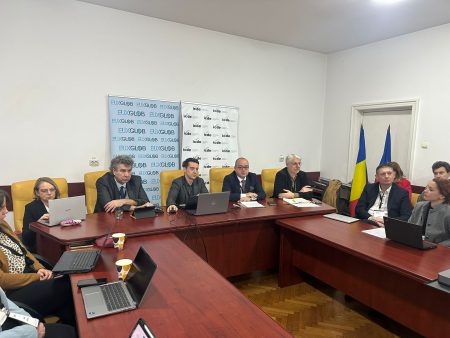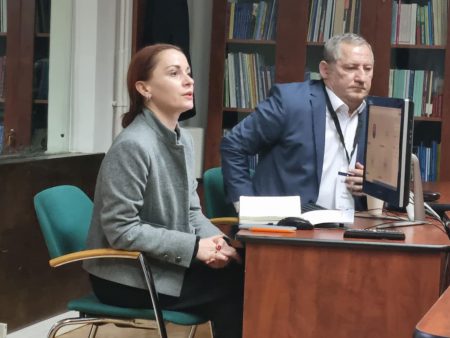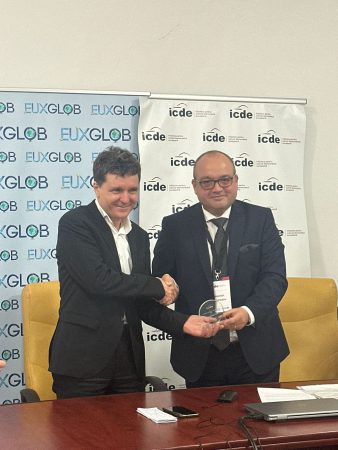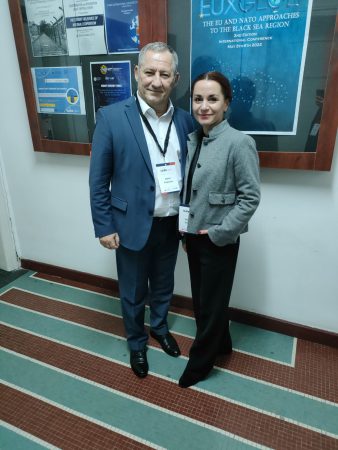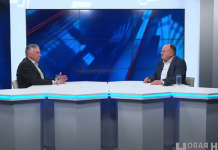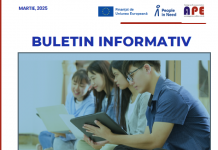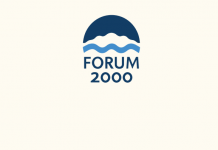EUXGLOB IV International Conference: “THE EU AFTER THE EUROPEAN ELECTIONS: Priorities, Challenges, Relations with the World”
Babeș-Bolyai University Cluj, Faculty of European Studies EUXGLOB Centre in partnership with REC and ICDE,
Cluj-Napoca, December 5-6, 2024 (hybrid format)
On 5 December, 2024 the EUXGLOB Conference opened with an impactful session in the Robert Schuman Room. Speakers included Associate Professor Adrian-Gabriel Corpădean, H.E. Ramona Chiriac, and Professor Valentin Naumescu, with thought-provoking keynotes by Professor Corneliu Bjola and Professor Ulrich Schneckener on the future of European security.
The first panel of the EUXGLOB Conference brought engaging discussions to the Robert Schuman Room. Chaired by Professor Sergiu Mișcoiu, the session featured insightful contributions from Professor Valentin Naumescu on the EU’s evolving role in a shifting world order, Professor Daniel Göler on the European Commission’s new role in CSDP, and Professor Petia Gueorguieva on the impact of populists in the European Parliament post-2024 elections. The panel also included Assistant Professor Ahmet Cemal Ertürk and Sena Türkdoğan discussing EU governance in Turkey’s energy sector, and Lecturer Liridon Lika exploring EU enlargement strategies in the Western Balkans amid the war in Ukraine.
The Panel 2 brought equally engaging discussions to the Nelson Mandela Room. Chaired by Associate Professor and executive director of the Foreign Policy Association (APE) Stercul Natalia, the session tackled diverse and timely topics. Highlights included Professor Magdalena Tomala’s insights on social justice in implementing the EU Green Deal in Poland and Dr. Ioana-nelia Bercean’s analysis of the EU-GCC strategic partnership amid Middle Eastern conflicts. A. Murat Tuncer examined the legitimacy of Türkiye’s 2023 presidential election, while Sena Türkdoğan and Assistant Professor Ahmet Cemal Ertürk explored EU post-election environmental policies. Finally, Javid Ibad addressed radicalization in the EU with a focus on the European Parliament elections in the Netherlands.
The session of the Panel 3 featured dynamic discussions from PhD candidates on pressing political topics. Adrian Ionuț Bogdan explored the Romania-Ukraine-Moldova cooperation in the EU’s Eastern Neighbourhood. Mădălina Tiurbe analyzed France’s political landscape and the impact of the 2024 EU elections, while Vlad Mărginaș discussed Greece’s center-right continuity amid political fragmentation. Diana Petruț examined EU-Latin America relations post-2024 elections, and Romāns Gagunovs reflected on the long-term viability of political parties in Latvia as a foundation for political security in challenging times.
The Panel 4, chaired by Professor Daniel Göler in the Nelson Mandela Room, covered various topics. Isabel Hoffmann and Katharina Kleynmans discussed migration and border management in the EU’s Eastern Partnership, while Associate Professor Alina Stoica and Bianca Larisa Gaidos examined Russian cultural diplomacy at the EU’s Eastern border. Lecturer Edina Lilla Mészáros explored the rise of realist geopolitics, and Assoc. Prof. Radu Nechita and colleagues analyzed the Draghi Report. The panel concluded with insights into cross-border logistics and tourism on the Romanian-Ukrainian and Romanian-Hungarian borders.
Panel 5, chaired by Senior Assoc. Prof. Petia Gueorguieva, featured discussions on EU stock market defragmentation (Assoc. Prof. Florin Duma), Moldova’s political balance (Dorin Ioan Dolghi & Dacian Duna), Transnistria (Assoc. Prof. Ana Pantea & Assoc. Prof. Ludmila Armașu-Canțîr), and Intercommunity Development Associations (Cosmin Chiriac). PhD candidates Maria Enachi and Mihaela Spînu also explored Moldova’s presidential campaign and European integration via social media.
Panel 6, chaired by Dr. Dorin Popeșcu, covered Russia’s nuclear blackmail (Yevhen Mahda), Belarus in EU policy (Sylwia Maria Zakrzewska), and Belarus as part of a new “Axis of Evil” (Zmicier Mickievič). Assoc. Prof. and executive director of the Foreign Policy Association (APE) Natalia Stercul discussed Moldova’s EU accession, and Vladimir Mitev & Piotr Wójcik explored EU power shifts. Assoc. Prof. Alina Andreica spoke on cybersecurity and AI, while Andrei Enghiș covered EU-NATO ties. Curtis D. Cordon discussed Transatlantic mobilization for Ukraine.
More information: https://www.facebook.com/EUXGLOB
